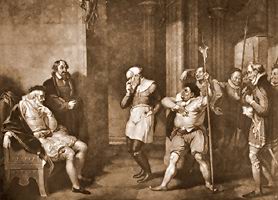Negative Capability
Schoolteacher Dana Dusbiber has created controversy with her Washington Post editorial on why she doesn't want to teach her charges Shakespeare when she could be offering them more relatable material. As controversies go, this one is pretty tired. I've been hearing it at least since I was reading Great Books in college, and presumably it goes back much further. There have even been books delving into this debate. The controversy is especially tired inasmuch as no one is strongly opposed, as far as I can tell, to drawing from wider sources of literature, as Dusbiber suggests.
But still, there's been a number of articles dealing with this issue, most using the same old (and often convincing) arguments in favor of great literature. However, the New Republic has published a rebuttal of Dusbiber that's particularly bad, and almost made me turns against Shakespeare, so I thought I'd discuss it.
It's by Elizabeth Stoker Bruenig, and is entitled "The Progressive Case For Teaching Shakespeare." She rehearses an argument you've heard before--that reading Shakespeare, or Chaucer, or Milton, or other DWEM, brings us into an alien world, teaching us how people could and did view things differently, giving us greater perspective on the world.
Understanding the past—especially its radical divergences from and continuities with the present—is more important than Dusbiber appears to believe. [...T]he jarring disparities between then and now can open up a political imagination that is foreclosed by living purely within the confines of current social and political thinking.
Fine, except that Bruenig quickly makes a radical divergence of her own.
Reading the literature of the past opens a window into a world in which the assumptions that dominate our lives were not yet imagined or fully formed, and shows us how people might live without the principles we mostly accept without question now. Consider, for example, past understandings of the poor. An 1189 sermon by French theologian Alain de Lille argues Christ could no [sic] live among princes, knights, or merchants, becase [sic] they live by plunder and greed: "Where then, can Christ live? Only among His paupers." It is one thing to entertain the thought of such a civilization that doesn't view poor people as deadbeats, leeches, or shiftless layabouts, and another altogether to peek into the interior lives of people who lived in such a world. Some medievals, for example, thought highly enough of the poor to seek their help in the afterlife: John Aderne, a 14th century English physician, advised that a good doctor "visit of his earnings poor men...that they by their prayers may get him the grace of the Holy Ghost." None of this is to say that the poor had it better then than now, only to point out that the way poor people are broadly conceived in our society -- as morally corrupt people who take advantage of others -- is not a necessary, logical, or obvious view.
So that's the purpose of great literature--to reinforce a shallow, bigoted view of modern politics? If Bruenig looks at the past and can only come up with confirmation of her close-minded misunderstandings of today's debate, then who needs Shakespeare? Might as well teach Mother Jones in the classroom and be done with it.


4 Comments:
If you click on her links to "prove" that Republicans believe the poor are deadbeats, leeches or layabouts, none of them actually have direct evidence of this. In fact, one of the links is to Obama saying Republicans call the poor leeches.
I don't understand. What better proof than the utterances of Great Leader could exist?
Note the use of "Consider, for example.." a phrase indicating that this is one way you could look at the past and great works from a different to make it seem more relevant to folks like the original complainer. Not sure I would agree with the analysis but its not dumb but I understand it apparently runs afoul of certain political beliefs expressed here and elsewhere. Jeez- get a mirror
Spare me. This woman looks at all the great work in the past and cherry picks a few odd bits to prop up her cramped, dishonest modern beliefs. I don't necessarily expect Shakespeare to make everyone rise above themselves, but this essay was so transparently silly I'm shocked after writing it she allowed it to be published.
I originally had a longer paragraph at the end explaining how she manages to get so much so wrong--wrong about the past, wrong about the present, wrong about what she believes, wrong about what others believe--but decided to cut that part since it was so obvious. Perhaps I was wrong.
Post a Comment
<< Home